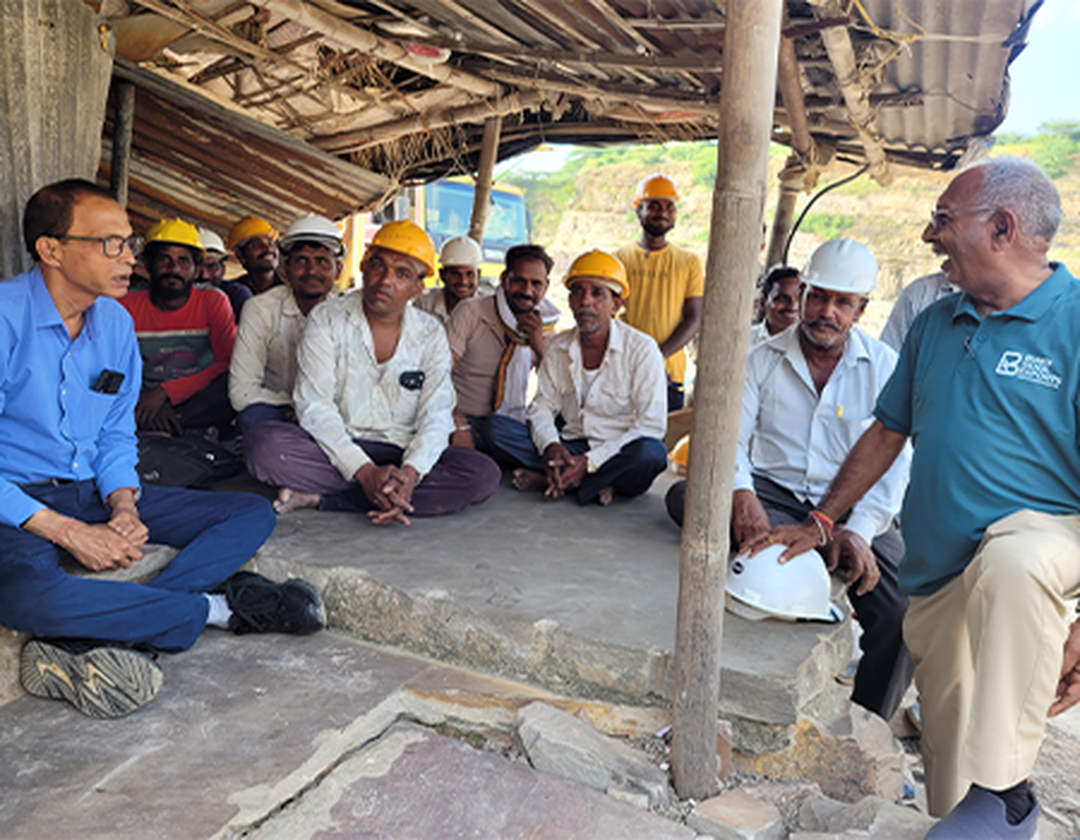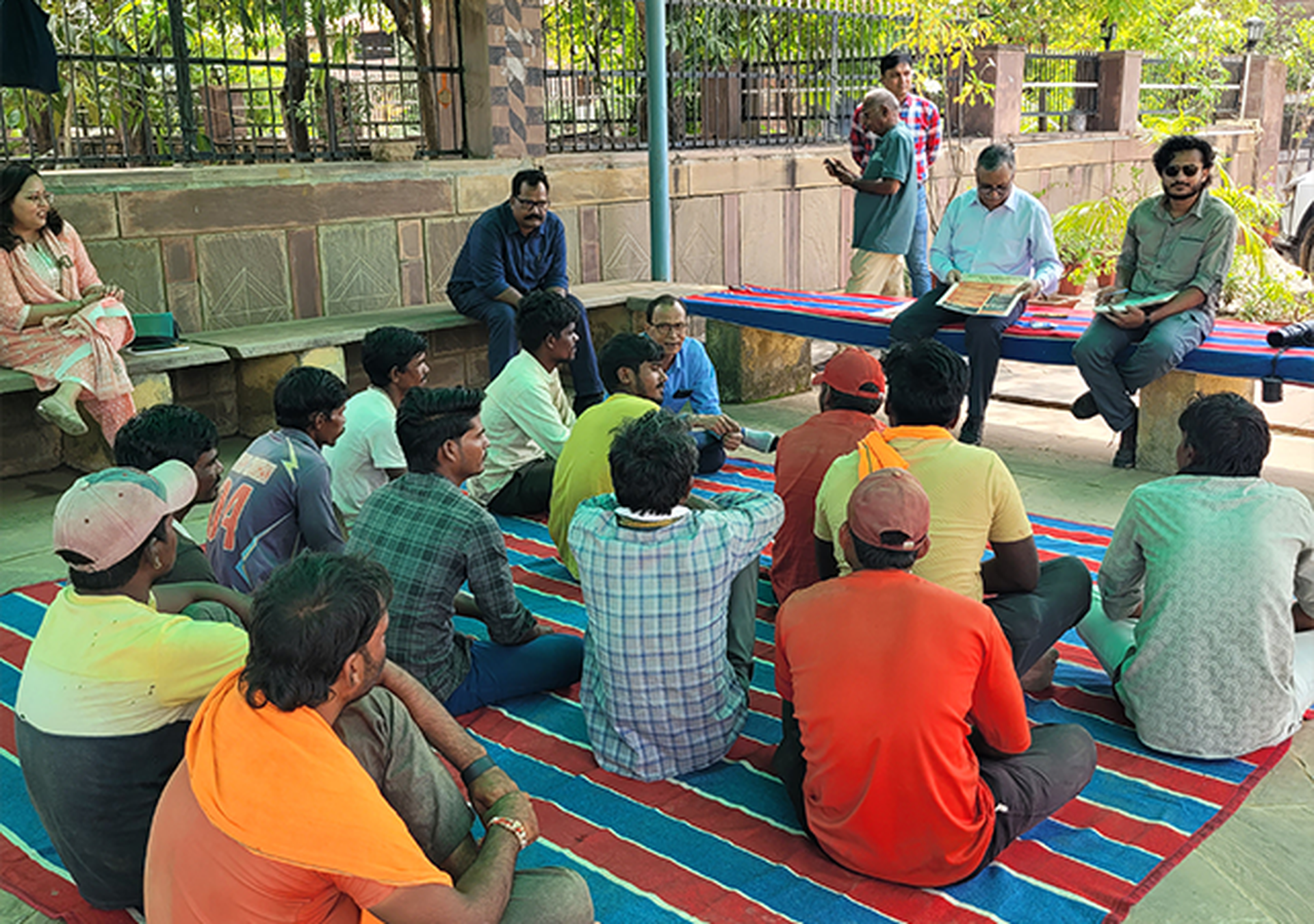Multistakeholder Dialogue Rajasthan 2025
Collaborating for better workplaces in the sandstone supply chain
In September 2025, Brachot took part in a multistakeholder dialogue in Rajasthan, India. This trip was part of a project with several TruStone members. In addition to their efforts within the TruStone initiative, they are developing a complementary project in their own supply chain, supported by the Dutch RVO.
Several sandstone producers in Brachot’s supply chain — quarries, factories and cobble yards — opened their sites to show the efforts they have made in recent years to improve working conditions. Together with another importer, the Dutch NGO Arisa, and the local NGO Manjari, we visited these locations to see the progress achieved on site.
At the various suppliers in Rajasthan, risk analyses were carried out as part of this RVO project. Based on these assessments, the stakeholders jointly formulated a series of actions through open dialogue, which were then implemented. These included administrative measures (developing policies, offering social security benefits to workers, establishing grievance committees) as well as practical improvements (providing additional personal protective equipment, adjusting work procedures).
In addition, several training sessions were organised for both management and workers, focusing on topics such as sustainable business practices and health and safety in the workplace.



Positive steps in the right direction
The themes in the multistakeholder dialogue focused mainly on workers’ personal safety, overall health within the companies, and the strengthening of social rights for employees. To achieve this, efforts were primarily directed at raising awareness of these needs among company leadership, management and workers. On site, it became clear that the producers had already taken many positive steps in the right direction.

One of the producers had already taken steps to set up several employee committees, giving workers a voice to raise concerns. In the factories, this involves a grievance committee where management and workers meet every two months to discuss and resolve complaints. All meetings are documented, and the members of this committee are democratically elected and visibly listed in the factory.
In the quarry, three committees were established — a grievance committee, a safety committee and a housing committee — each composed of democratically elected representatives from both workers and management. These committees meet regularly to discuss and address various topics. During our visit, we attended several of these meetings.
Improving working conditions in the cobble yards
Special attention was given to the hand-production sites (“cobble yards”), where sandstone cobbles are produced entirely by hand. These cobble yards are the focus of the next phase of the project. Given the challenging working conditions, providing personal protective equipment plays an important role: gloves, safety shoes, mobile shade structures, … combined with training and awareness-raising for workers and the appointment of a certified first-aid responder for each cobble yard (multiple training sessions are planned). Attention is also being given to essential infrastructure such as toilets and drinking water.

Finally, we also visited the local NGO Manjari, which has established a community centre in the Budhpura community. This centre, created as part of the No Child Left Behind project in which Brachot was actively involved together with the international NGO Arisa, offers a classroom and a library where children can follow (online) lessons. Manjari has also set up a separate space where free medical screenings are provided to the community. A doctor will visit weekly to carry out medical check-ups.
Next steps in sustainable progress
At the end of the trip, the entire process was evaluated and an assessment was made of the possible next steps. The aim is to continue providing training for both company management and workers, to keep improving working conditions in the hand-production sites (“cobble yards”), and to further develop social security mechanisms at the producers. The local suppliers responded very positively to these improvements, clearly recognised their added value, and are motivated to continue the improvement process.
The visit to Rajasthan was a strong example of how cooperation between different stakeholders and partners in the production chain can lead to concrete results. These joint efforts are bearing fruit, yet we continue to pay close attention to appropriate working conditions at the producers who manufacture our sandstone cobbles.

TruStone is a joint initiative in which the Flemish and Dutch natural stone industry, Flemish and Dutch governments, NGOs and trade unions work together towards the responsible production and purchase of natural stone. The members of this covenant commit themselves to responsible business practices with respect for people and nature.